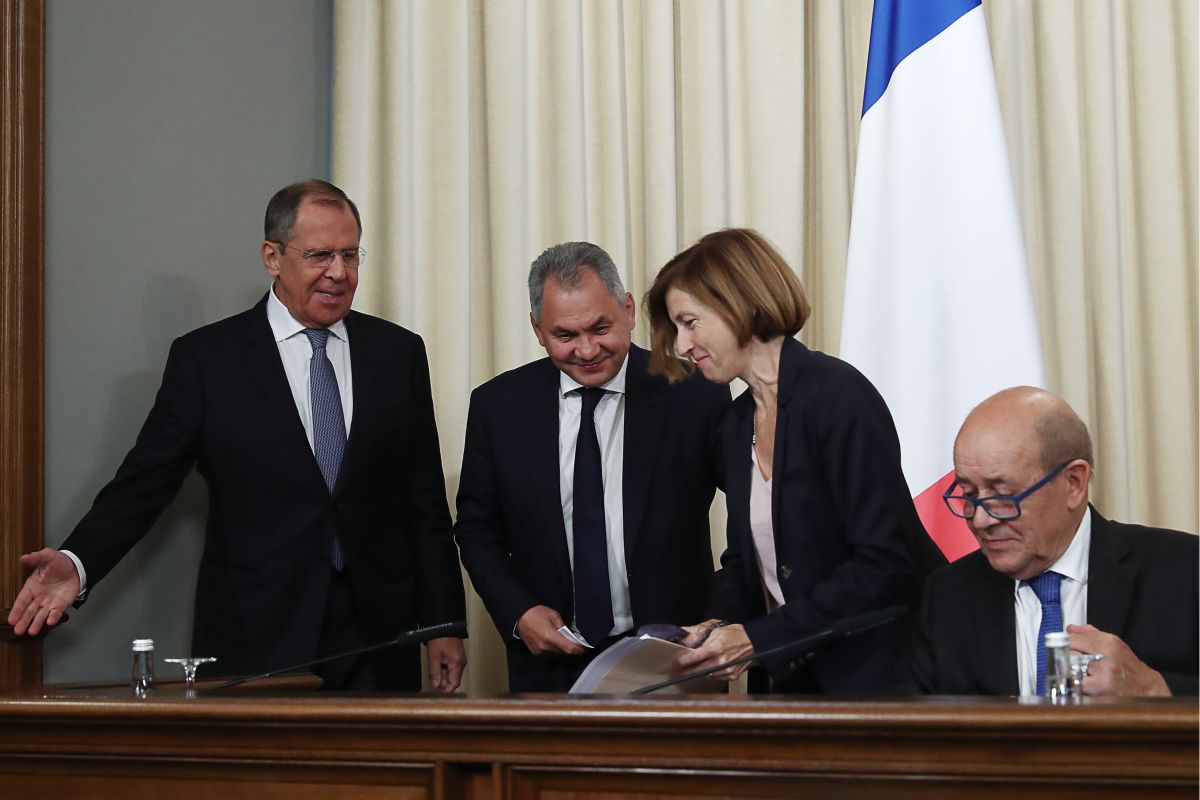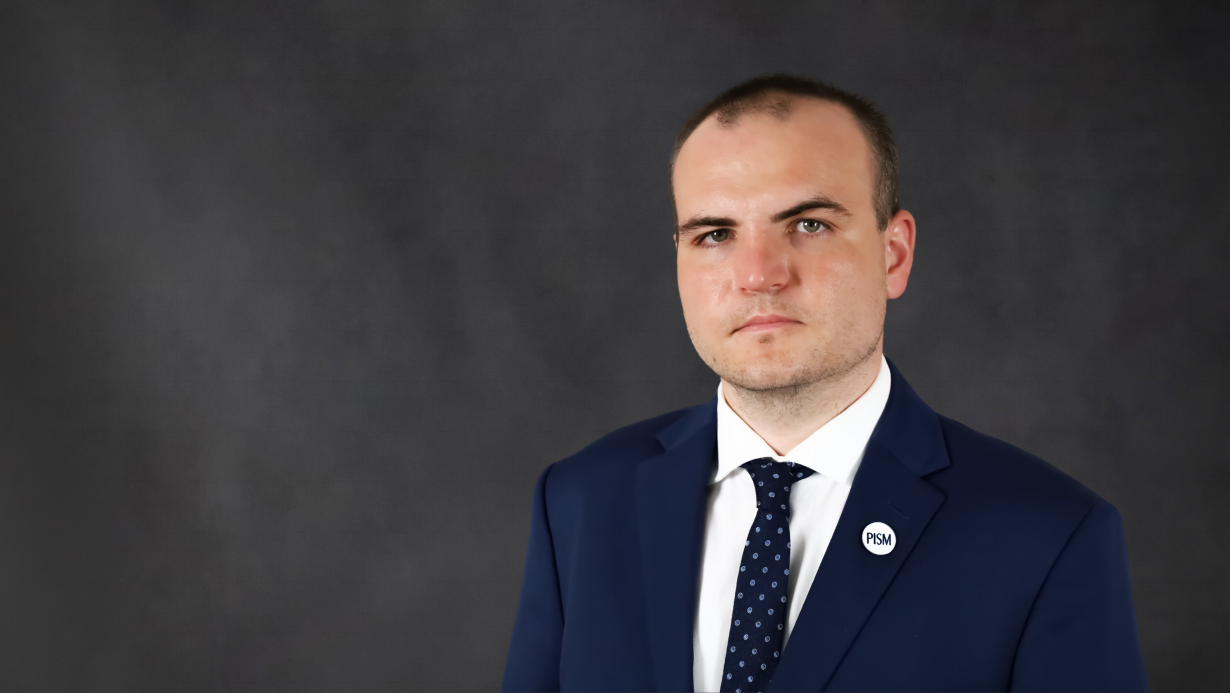Strategic Patience: French Interests and the Dialogue with Russia
Concerns about Mali’s plans to invite the private military company Wagner Group for security operations, the forced migration hybrid attack by Belarus on the EU’s borders, and the aggravation of the situation in eastern Ukraine have renewed a discussion in France on relations with Russia. Despite warnings from some experts, President Emmanuel Macron believes that direct dialogue with Russian President Vladimir Putin is the only way to resolve the disputes. The French authorities are avoiding a more resolute policy towards Russia, fearing the reaction of the pro-Russia opposition, the weakening of France’s position towards the U.S., and the growing importance of NATO.
 Fot. Anton Novoderezhkin/TASS/Forum
Fot. Anton Novoderezhkin/TASS/Forum
The Franco-Russian dialogue initiated in 2019 by Macron and Putin was intended to increase trust between the countries, and then in EU-Russia relations. Macron had said he hoped that it would be in the interest of the Russian authorities to implement the Minsk agreements in exchange for French support for the lifting of some of the sanctions. Improving EU relations with Russia could, in the opinion of the French authorities, facilitate the building of EU strategic autonomy by making the Union’s foreign policy less dependent on its American ally and by defining shared security interests with Russia in Eurasia. Despite several meetings at the highest level and regular phone calls between the two leaders, France has not managed to get concessions from Russia regarding Ukraine, while Putin’s support for Alexander Lukashenka keeping him in power in Belarus, the attempt to kill Alexei Navalny, and Russia’s activity in Africa have made agreement even more difficult.
Russia: “Our Troubled Neighbour”
The French are particularly concerned about the cooperation between Russia and Russian private military companies (PMCs) in the former French colonies in Africa. When rumours emerged in August 2021 of negotiations taking place between Mali’s interim government and the Wagner Group PMC, the French authorities responded by threatening to withdraw their anti-jihadist forces from the country. At the request of France, EU foreign ministers also agreed in November 2021 to draw up a list of sanctions against Russian entities if Wagner Group contractors actually appear in Mali.
The threat of the presence of the Russian mercenaries rose when the French authorities tried to reduce their military presence in the Sahel by encouraging partners in the EU to join the French-led multinational Takuba mission. French public opinion is tired of the fighting taking place there and the resulting human losses. At the same time, the French authorities want to avoid the impression that they are withdrawing under pressure from Russia.
The disputes with Russia in Africa have not led to a change in France’s attitude to the Russian threat to the EU, NATO, and their partners (especially Ukraine). The French authorities would like to end or freeze the Russian-Ukrainian conflict through negotiations under the Normandy Format and the implementation of the Minsk 2 Protocol. They are reluctant about the possibility of extending the Normandy Format (e.g., to include the U.S. or UK), because in German-French cooperation they see an opportunity to emphasise the role of the EU as a superpower shaping the situation in its neighbourhood. France is also concerned that NATO assistance to Ukraine will increase Russia’s aggressiveness. In his phone call with Putin in mid-November 2021, Macron, responding to the concentration of Russian troops near the border with Ukraine, declared his will to defend that country’s territorial integrity, although he did not indicate how France would do that. The French arms industry is interested in exporting arms (e.g., Rafale planes) to Ukraine, but the French authorities fear a worsening of relations with Russia if they allow it.
Strong words about Russia’s presence in Africa or its provocations of Ukraine do not prevent France from advocating dialogue with Russia. Macron and Foreign Minister Jean-Yves Le Drian have repeatedly said that Russia is first and foremost a neighbour of the EU and cannot be ignored. Dialogue with Russia is also to be, in the eyes of the French authorities, a remedy for the crisis on the Belarus-EU border, as only Putin can exert effective pressure on Lukashenka.
Russia: an Indispensable Partner
The last event in the Franco-Russian dialogue was the resumption of talks between the foreign and defence ministers of France and Russia in November 2021 after a year-long break stemming from the poisoning of Navalny. The conviction about the need for dialogue is reinforced by tensions in French-Chinese relations, France’s disputes with the U.S. over the AUKUS alliance, and the rivalry with Turkey in the Mediterranean. Macron aims to prevent a bipolar rivalry between the two superpowers (the U.S. and China) in which other countries, including France and Russia, would have to take sides. It is therefore in the interest of the latter to support France’s goal in this instance by improving relations with the EU.
An important role in the French attitude towards Russia is played by the coordination of relations with Germany. Macron is unhappy about the completion of the Nord Stream 2 (NS2) gas pipeline, which will make the EU even more dependent on Russian gas. Some French economic circles believe, however, that both the EU and French demand for gas will increase during the energy transformation. The French authorities are also concerned that blocking NS2 by U.S. sanctions would deepen the EU’s dependence on the Americans. France and Germany’s unsuccessful initiative to organise an EU-Russia summit with Putin, presented in the summer of 2021, would have been, in the opinion of the French authorities, a manifestation of the independence of the EU’s foreign policy. But it also would have meant acceptance by the other Member States of the Franco-German flexible approach to Russia.
Although Franco-Russian trade (€11 billion in 2020) accounts for only half of France’s exchange with Poland, the myth of the unlimited absorptivity of the Russian market influences the French debate. The role of French companies in Russia is emphasised, as they are the largest foreign employers on the Russian market (160,000 employees). France was also ranked second among foreign investors in Russia ($16.8 billion, including investments by Total Yamal LNG and Arctic LNG 2). In France, the difficult conditions of investing in Russia are rarely discussed (for example, the arrest of French businessmen for the purpose of blackmail). The exception was the ban on the use of the term “champagne” in Russian by French producers on the Russian market, which inflamed relations in 2021.
Dialogue with Russia is also fostered by the dynamics of French domestic politics. A 2019 poll showed that 53% of the French expect an intensification of relations with Russia. As many as 57% believe that Russia is presented in a falsified manner in French media. Most of Macron’s competitors, apart from the socialists and the Greens, believe that one of the reasons for the decline in France’s importance in global politics is its bad relations with Russia. These arguments are raised especially by the far right (Éric Zemmour, Marine Le Pen), but also by the populist left (Jean-Luc Mélenchon) and the Gaullist party (Eric Ciotti). At the same time, criticism that Macron is submissive to Russia comes from expert elites and journalistic circles, to which Macron refers pejoratively as the “deep state”.
Conclusions and Prospects
France is trying to separate the rivalry with Russia in Africa as well as the assessment of the situation in Ukraine and Belarus from EU-Russia and NATO-Russia relations. The French authorities, like the vast majority of the opposition, favour resolving the disputes arising from Russia’s aggressive behaviour in Europe through direct dialogue with Putin. Russia will continue to use this goodwill to increase divisions in the EU. France’s cautious tactics may be thwarted if Russian intensifies its aggression against Ukraine, as that would force France to support a tightening of sanctions. The purchase by Ukraine of strategically important military equipment (e.g., fighters) from France could also induce the French authorities to take greater interest in Ukraine and weaken the blowback from pro-Russia circles in France.
The situation in Mali now seems to be the most serious problem in Franco-Russian relations. Hence, the possible actions to prevent the increase of Russian influence in this country, also through EU sanctions. France will try as well to increase the participation of EU partners in the military missions in the Sahel so that the problem of the Russian presence there is felt by the entire EU. The announced participation of Poland in the Takuba mission in Mali will strengthen its arguments for a revision of the EU and France’s policy towards Russia.
At home, Macron feels no impulses that would make him more assertive towards Russia. Rather, most of his competitors accuse him of being submissive to the U.S. France is therefore a convenient place for Russia to conduct destabilising actions during the upcoming election campaign, including by supporting candidates sympathetic to it.


